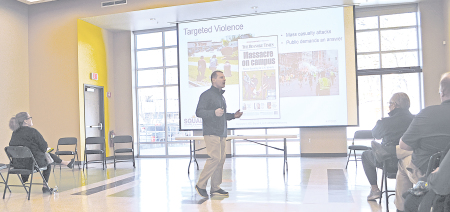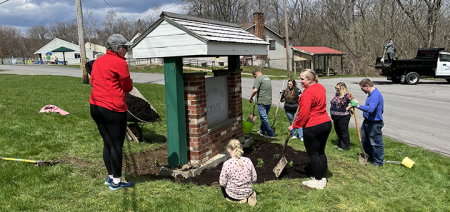Condolence Call: A Short Story By Shelly Reuben
Published:
August 3rd, 2018
By:
Shelly Reuben

Old guys like me fall in love at least once a week. It is a harmless occupation more akin to admiration than to passion, and the objects of my interest were usually anonymous souls like my golden haired pharmacist or the green-eyed girl at the grocery story. And then there was my neighbor across the street. I didn’t know her name, but I called her Mrs. Dutta because that’s what was written on her mailbox.
My wife, bless her memory, not only spoiled me, she also trained me well. We met when I was 24 years old, three years home from the Gulf War and none too tidy in my habits. Minnie, town librarian, was as pretty as a spring tulip, and as soon as my eyes fell on her, I knew she was the one. At first, I couldn’t figure out why she had consented to marry me. Then I decided she was like a gardener who can’t walk past weeds in a flower bed without wanting to pull them out.
Minnie married me to weed my garden.
She taught me how to decorate (my mud-colored carpet and pea-green sofa had to go); eliminate clutter; pick paintings for the walls; and keep the house spic and span. When she knew she was dying, she said to me, “Harold, your home is your castle. Keep it that way.”
And I do.
I tend to her gardens, fertilize the roses, prune the lilacs to encourage bottom growth, and kill the grubs. But I never experiment with new plants, so everything is just about the same as it was before Minnie died.
As to Mrs. Dutta, my across-the-street neighbor, she’s somewhere between 40 and 50 years old. Slim with angular features and a handsome face. Even though I’m usually a friendly sort, I didn’t introduce myself to her. At least, not then.
Have you ever seen a shadow box? They’re about twice the size of a shoebox and hang on walls in a galleries or museums. They depict scenes - called dioramas - of rooms in houses or incidents from a book or a poem. Once Minnie took me to an exhibition of shadow boxes, and I liked them a lot. Each was like looking into a little dream, and the longer you looked, the more the dream drew you in.
My favorite was a moonlit cornfield with a scarecrow, a carved pumpkin, and a spooky haunted house. My second favorite was a rose covered cottage (how did they find ceramic roses so small?) with a blue sky, a white picket fence, and hollyhocks growing beside the door.
It’s because Mrs. Dutta reminded me of a little itty bitty person living inside a shadow box that I didn’t introduce myself. She was so intent on her garden, I didn’t want to disturb her. I didn’t want her to know I was there.
Years before, she had planted six saplings of a variety I’d never seen before but soon discovered were crepe myrtle.
Crepe Myrtle. Gorgeous trees!
They grow over 15 feet tall, and their flowers resemble lilac, hydrangea, and wisteria, but bigger and more exuberant. I don’t know what other colors they come in, but Mrs. Dutta’s were pink with just a tinge of purple, and they were lined up like sentinels along the side of her property. The side that faces my house.
Their blooms last from mid-summer to October. At least, they’re supposed to.
Every morning, I would admire them from my living room window, and every evening after Mrs. Dutta got home from work, I would watch her studying each one with a secret smile on her face, the way a miser might look at his money. Except there’s nothing miserly about a beautiful woman taking care of her trees.
Well, that’s how it was year after year until this past spring.
March came, and tiny green shoots appeared on forsythia and oak trees. April came, and lilac, maple, and crabapple trees began to leaf out.
By then, the first buds on my neighbor’s crepe myrtle trees should have started to show, too. But they did not.
Every evening, Mrs. Dutta would walk along her line of trees like a drill sergeant checking his troops for rusty rifles or unpolished shoes. And every evening, she would sadly shake her head.
So passed the months of April, May, and June. Abundant greenery everywhere else, but no leaves or life on Mrs. Dutta’s crepe myrtle.
I was sad as well, for I was being deprived of my splendid horticultural spectacle in the shadow box across the street. It was a sorrowful time. Night after night, I watched as Mrs. Dutta’s persisted with her melancholy inspections until one mild evening just before twilight, I was so affected by her heartache that I was compelled to break my self-imposed silence.
Approaching slowly lest I frighten her away, I said in a low voice, “I’m Harold, and I live there,” I pointed to my house. “I don’t want to intrude on your grief, but I wanted to convey my condolences. They were such beautiful trees.”
She raised her head and smiled. It was welcoming and mournful at the same time. “I’m Alice,” she said, and reached out a hand. I took it, and we shook. Such a small hand. Like a cluster of rose petals.
A tear glistened in her eyes. “I called the arborist,” she said. “He can remove all six trees by Friday.”
I tsk tsked in sympathy. “Will you replant?”
She pursed her lips and said softly, “I’m afraid.”
Oh! Didn’t I understand exactly what she meant! I nodded in agreement. Then, quickly re-thinking my position, I mused, “But isn’t it better to have loved and lost than...”
“…never to have loved at all?” Mrs. Dutta finished the quotation. She shrugged. “I don’t know.”
I shook my head and approached the first crepe myrtle in the row. It had a tall, slender trunk, once brown but now an anemic grey. I reached up to break off a twig the way one does almost instinctively with dead things, but the twig did not break. I pulled down the branch to find out why. It was not stiff and brittle, as I had expected, but supple and springy. So I pulled it down farther, scratched at the branch’s bark with my fingernail, and studied the results. Underneath its thin coat of grey, I saw…green.
Green!
“Alice,” I exclaimed, “Come here.”
She did. Then, together, we examined the branches of the other five trees.
Alive. All six. Alive!
“Mrs. Dutta,” I said.
“Alice” she corrected.
“Alice,’ I said. “I think you can cancel the arborist.”
She nodded. Her smile was so bright, my heart did a cartwheel in my chest and then clicked its heels.
That was in June. It is August now. All of the branches on Mrs. Dutta’s crepe myrtle trees have leafed out, and on a few of them, I can see infinitesimal evidence of flowers to come.
Mrs. Dutta, it turns out, is a widow.
Lovely lady. Beautiful trees.
It is going to be a good year.
Yes. A good year, indeed.
Copyright © Shelly Reuben, 2018. Shelly Reuben’s books have been nominated for Edgar, Prometheus, and Falcon awards. For more about her writing, visit www.shellyreuben.com
Author: Shelly Reuben - More From This Author
Comments








